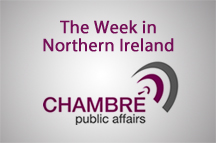.jpg) Brexit may have been the headline issue during the Conservative Party conference, but in Northern Ireland it still vexes the political parties, with varying degrees of enthusiasm for Prime Minister Theresa May’s announcement of the potential timing of departure from the EU.
Brexit may have been the headline issue during the Conservative Party conference, but in Northern Ireland it still vexes the political parties, with varying degrees of enthusiasm for Prime Minister Theresa May’s announcement of the potential timing of departure from the EU.
The DUP, in particular, was seemingly at odds with itself. For such enthusiastic supporters of ‘leave’ there was a subtle shift in tone on the issue.
While Arlene Foster was full of enthusiasm for the Brexit process after her meeting with the PM, Lagan Valley MP Sir Jeffrey Donaldson said “what we’re really looking for is a special deal for the island of Ireland, which enables free movement of goods and people on the island, and preserves the institutions we’ve created under the various agreements”.
Perhaps the policy position was ‘lost in translation’ in the same way the DUP’s Brexit event at the Tory conference was listed as a ‘champagne reception’, despite the unionist party being famous for its abstinence status, with former party leader, the late Rev Dr Ian Paisley, declaring alcohol as the “devil’s buttermilk”.
Mrs Foster laughed that off, saying the reception was meant to be billed as a less controversial ‘drinks reception’ and that it “was all good PR”.
Sinn Féin, the DUP’s partner in the NI Executive, are not quite as casual about Brexit, with deputy First Minister, Martin McGuinness, rejecting the reassurances of Northern Ireland Secretary of State, James Brokenshire, that the region can be a success outside of the European Union.
Indeed, Mr McGuinness claimed that after Article 50 was triggered, Northern Ireland would end up as “collateral damage”.
At the same time as this jostling over Brexit, Belfast’s High Court is hearing a challenge to the referendum result from a cross-party group of local politicians – with Raymond McCord, a victims’ campaigner, mounting a separate bid to stop the UK exiting the EU.
 As the various party’s hierarchies were making their points on leaving the EU, there was a continuing controversy in Stormont’s Finance Committee. The committee had been investigating the sale of the Northern Ireland assets of NAMA, the Irish state organisation set up to deal with the bad debt of the country’s banks after the 2008 property crash.
As the various party’s hierarchies were making their points on leaving the EU, there was a continuing controversy in Stormont’s Finance Committee. The committee had been investigating the sale of the Northern Ireland assets of NAMA, the Irish state organisation set up to deal with the bad debt of the country’s banks after the 2008 property crash.
While this has been the focus of allegations and counter allegations, the focus shifted when the former chair of the Stormont Finance Committee, Daithí McKay, was accused of coaching a witness before he gave evidence on NAMA. While Mr McKay subsequently resigned his Assembly seat in August, his party colleague and Sinn Fein Finance Minister Martín Ó Muilleor was defiant this week in the face of questioning on his possible involvement in the coaching saga.
Finally, Thursday saw one major departure. Alliance leader, David Ford, is stepping down, with his East Belfast colleague Naomi Long likely to take over the top slot. Mr Ford will go down in political history as the first person to take up the post of Justice Minister when policing and justice powers were devolved to Northern Ireland in 2010.














